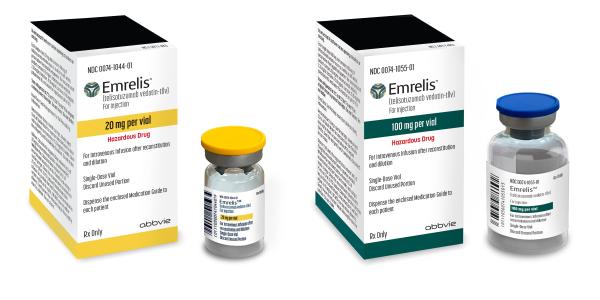Emrelis Side Effects
Generic name: telisotuzumab vedotin
Note: This document provides detailed information about Emrelis Side Effects associated with telisotuzumab vedotin. Some dosage forms listed on this page may not apply specifically to the brand name Emrelis.
Applies to telisotuzumab vedotin: intravenous powder for injection.
Important warnings
This medicine can cause some serious health issues
Telisotuzumab vedotin can cause severe and life-threatening side effects after the injection.
Call your doctor right away if you have numbness, tingling, or burning pain in your hands or feet, blurred vision, eye pain or redness, fever, cough, feeling short of breath, or you feel dizzy, nauseated, light-headed, itchy, sweaty, or have a headache.
Get emergency medical help if you have signs of an allergic reaction: hives, difficult breathing, swelling of your face, lips, tongue, or throat.
Telisotuzumab vedotin (the active ingredient contained in Emrelis) can cause severe and life-threatening side effects. Call your doctor right away if you have numbness, tingling, muscle weakness, or burning pain in your hands or feet, blurred vision, eye pain, swelling, or redness, increased sensitivity to light, fever, cough, wheezing, or feeling short of breath.
Some side effects may occur during the injection. Tell your medical caregiver if you feel dizzy, nauseated, light-headed, itchy, sweaty, or have a headache, chest tightness, back pain, trouble breathing, or swelling in your face.
Your cancer treatments may be delayed or permanently discontinued if you have certain side effects.
Common side effects may include:
-
loss of appetite;
-
abnormal blood tests;
-
nerve problems, swelling in the feet, ankles, legs or hands; or
-
tired feeling.
This is not a complete list of side effects and others may occur. Call your doctor for medical advice about side effects.
See also:
For healthcare professionals
Applies to telisotuzumab vedotin: intravenous powder for injection.
General adverse events
The most frequently reported side effects were decreased appetite, fatigue, peripheral edema, and peripheral neuropathy. The most frequently reported grade 3 or 4 laboratory abnormalities were decreased calcium, decreased hemoglobin, decreased lymphocytes, decreased phosphorus, decreased sodium, increased ALT, increased glucose, and increased GGT.[Ref]
Cardiovascular
- Uncommon (0.1% to 1%): Myocardial infarction, noninfectious endocarditis[Ref]
Gastrointestinal
- Very common (10% or more): Nausea (up to 15%), constipation (up to 14%), vomiting (up to 10%)[Ref]
Hematologic
- Very common (10% or more): Decreased lymphocytes (up to 37%), decreased hemoglobin (up to 35%), decreased WBC (up to 16%), decreased platelets (up to 14%), decreased neutrophils (up to 10%)[Ref]
Hepatic
- Very common (10% or more): Increased ALT (up to 41%), increased GGT (up to 36%), increased AST (up to 34%)[Ref]
Immunologic
- Very common (10% or more): Positive for antidrug antibodies (up to 22%)
- Common (1% to 10%): Development of neutralizing antibodies[Ref]
Metabolic
- Very common (10% or more): Increased glucose (up to 58%), decreased appetite (up to 22%), decreased glucose (up to 11%)[Ref]
Musculoskeletal
- Frequency not reported: Arthralgia[Ref]
Nervous system
- Very common (10% or more): Peripheral neuropathy (up to 51%)
- Frequency not reported: Dizziness[Ref]
Ocular
- Very common (10% or more): Ocular surface disorders (up to 25%), blurred vision (up to 15%), keratitis (up to 11%)
- Common (1% to 10%): Dry eye
- Frequency not reported: Photophobia[Ref]
Blurred vision included blurred vision, reduced visual acuity, and visual impairment.
Keratitis included corneal cyst, corneal disorder, corneal erosion, corneal edema, corneal opacity, keratitis, interstitial keratitis, and punctate keratitis.[Ref]
Other
- Very common (10% or more): Decreased albumin (up to 61%), decreased calcium (up to 47%), decreased phosphorus (up to 33%), decreased sodium (up to 30%), increased alkaline phosphatase (up to 30%), fatigue (up to 29%), peripheral edema (up to 22%), decreased potassium (up to 14%), decreased magnesium (up to 14%), increased magnesium (up to 10%)
- Common (1% to 10%): Infusion-related reaction
- Uncommon (0.1% to 1%): Sudden death[Ref]
Renal
- Very common (10% or more): Increased creatinine (up to 16%)[Ref]
Respiratory
- Very common (10% or more): Pneumonia (up to 13%), interstitial lung disease/pneumonitis (up to 10%)
- Common (1% to 10%): Pleural effusion
- Frequency not reported: COVID-19[Ref]
References
1. (2025) "Product Information. Emrelis (telisotuzumab vedotin)." AbbVie US LLC
More about Emrelis (telisotuzumab vedotin)
- Check interactions
- Compare alternatives
- Pricing & coupons
- Drug images
- Dosage information
- During pregnancy
- FDA approval history
- Drug class: miscellaneous antineoplastics
- En español
Patient resources
Professional resources
Related treatment guides
Further information
Emrelis side effects can vary depending on the individual. Always consult your healthcare provider to ensure the information displayed on this page applies to your personal circumstances.
Note: Medication side effects may be underreported. If you are experiencing side effects that are not listed, submit a report to the FDA by following this guide.

